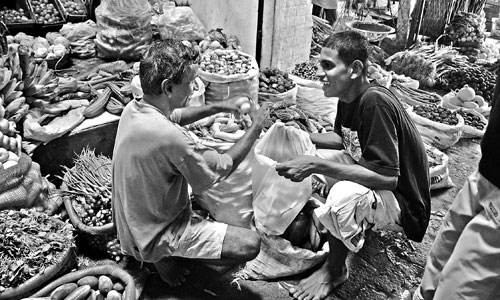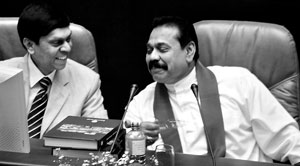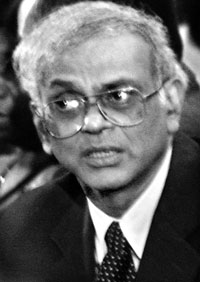
Lies, damned lies and statistics GDP up despite mounting problems, high inflation
Sri Lanka’s sharp rise in growth (GDP) last year to 7.4 percent from 6 percent in 2005 declared by the Central Bank has triggered a huge debate amongst economists and civil society as to how it was possible given the array of problems such as the rising cost of living, the highest inflation rate in the history of the country and an overall decrease in the quality of life. Lead economist at Lirneasia, Harsha De Silva told The Sunday Times FT that according to the statistics, the economy has grown by 7.4% but that it is 'demand induced growth' or 'deficit spending'. "The government has spent a lot on itself, for instance te expenditure in public corporations and in government institutions," De Silva said. "These are areas in which they can induce aggregate demand so part of that is obviously defense. An increase in government expenditure then shows up in the GDP number." Socio-economist Ajith Colonne attributed three factors to the rising GDP, the first being the high domestic military expenditure. The second is the tsunami reconstruction expenditure which is also included in the GDP and third is the rampant corruption in government. "If corruption is high, that growth is also embedded into the GDP," he said. "The government and their circle, which are a handful of people, are enjoying these benefits." The highest ever inflation the country has ever seen since independence which stands at 20% is the specific reason this debate is coming to the forefront. "This is cost push inflation. Costs keep going higher and higher." Greenspan theory De Silva explained that the government has been spending money it does not have and has been printing money to make up for the shortfall. "The Central Bank admitted that it printed Rs.38.5 billion last year to meet part of this deficit. So this is what created the high inflation; so while it is true that the economy has grown, it grew to a certain extent with printed money. People cannot feel the 7.4% growth. What people feel is the high cost of living. The people have been taken for a ride."
Inflation was at 19.5% at the end of December 2006 and De Silva attributed this to the large expenditures in the salaries of the public sector and the hiring of 42,000 graduates. "The real salaries of what is tracked by the Central Bank for the 5 million private sector employees, some of who are in the wages board actually declined." De Silva said wages in the agriculture sector declined by 10%, industry and commerce declined by 11% and the services sector, where most are employed and accounts for approximately 50% of the GDP declined by 12%. "The government has spent on itself, including increasing their salaries and they reap the benefit. Everyone else lost out." Moderator for the Movement for National Land and Agriculture Reform (MONLAR), Sarath Fernando, whose group defends the rights of peasant farmers, said the GDP of measuring the country's success in economic performance is 'totally meaningless.' He explained that when the rich become richer and big business expands and money has to be spent on weapons for war, this will yield a high indicator on the GDP when per capita income is calculated. "The GDP growth rate increase can result in making the life of the poor people worse. From 1977 up to now, Sri Lanka has tried to achieve vast economic growth and it has been said that the growth will automatically trickle down to the poor and improve their lives. It doesn't happen and it hasn't happened in Sri Lanka. It has actually worked in the reverse direction." War spending "The situation of the poor becomes worse and the cost of food, medicine, kerosene, fuel and everything else has gone up," Fernando continued. "The incomes of these people and more than half the population is very low." Approximately 2.1 million families nationwide receive incomes of less than Rs.1500 per month. "Their situation is becoming worse despite the per capital income going up. It is criminal to count on economic factors by looking at the GDP." Lirneasia economist De Silva says it is imperative for the government to control inflation by halting the printing of money, which to an extent they already started, and to reduce the credit to the private sector. Currently, the government is trying to reduce credit by increasing interest rates which De Silva says is the wrong way to go. "Interest rates for a small or medium business are well over 25% which is making it difficult for the general economy to grow." Despite 7.4% growth for the cumulative four quarters, the quarterly growth rates show a steady decline. The first quarter showed an 8% decline, the second quarter a 7.7% decline, the third quarter a 7.4% decline and the fourth quarter showed a 6.2% decline. Unless interest rates are eased and the private sector can grow much faster, our growth rate for next year will come down." Moreover, De Silva says the government cannot sustain such high deficit spending in 2007. "If they did the same thing they did last year, they will have to print more money to meet the growing deficit." The government is going to the international market and borrowing at commercial rates on short durations. During the course of this year alone, the government has borrowed approximately US$300 million at very high commercial rates. "They are only postponing the crisis. Usually, these loans come up for repayment in around 3 years. They are just buying time so they don't have to borrow in the local market and push the rates up any further.""The government has reduced real wages of the private sector but they have also destroyed their only savings, the EPF," continued De Silva. "The objective of the EPF is to bring at least 4% of real positive return. If you look at the return on EPF investment last year, it is almost negative 4%. On an investment portfolio of Rs.461 billion, the government has invested in interest bearing securities, 98% of which went into treasury bills and rupee loans and so the interest income was only Rs.44 million. The government is only looking out for themselves." Lame opposition The Ceylon Petroleum Corporation and the petroleum sector have a combined debt close to Rs.50 billion, a figure which has doubled since the previous year. "This goes to show the absolute inefficiency of state management running these corporations." Furthermore, all the losses result in the eroding wealth of the public of this country unless they can be reformed. De Silva pointed out that the only sub sector in which prices went down the last year, despite the 20% inflation, was the telecommunications sub sector. "Prices actually fell which means there is a lesson to be learned from the liberalization of the telecom sub sectors." Around 20% of the 7.4% GDP growth is accounted for by the telecommunications sub sector whereas the contribution from the agriculture sector is only 1%. "Reforms work.It creates competition, makes the quality of services better, brings down prices, the sectors become efficient and investments come in." Most of the foreign direct investment for 2006 came into the telecom and IT sub sectors. In order for the country to move onto higher growth, vast reforms have to be made in agriculture, infrastructure and education. Socio-economist Colonne says he does not see any improvements forthcoming, particularly if military operations become more intensified. Several industries are ailing such as the tourism industry. "If the military situation continues, the tourism industr will be the victims," he said. "Industrialists are struggling with the escalating costs of production and our competitive advantage is eroding in the international markets." Colonne said with the International Monetary Fund (IMF) pulling out of Sri Lanka in February 2007, most likely due to the expected increase in the balance of payment deficit in the future owing to the military procurements, the situation will become critical. "The IMF is expecting the balance of payment deficit to widen further and they don't want to help the government." He also said another reason for the pullout may be due to the government not listening to them. "There is going to be severe foreign exchange crisis in the time to come. Tsunami funding has been drained and there is the sharp deterioration of the rupee due to large military procurements. We will have enormous suffering to go through if the war continues." Chairman of the Ceylon National Chamber of Industries, A.K. Ratnarajah said he feels that even though there has been a certain amount of dialogue with the government, he does not see things happening practically on the implementation side, possibly due to other priorities of the government. Ratnarajah also said the government is unlikely to be able to control interest rates because of the 'overdependence on the state sector.' He said there is too much employment and not enough productivity. According to the Central Bank, the key economic indicators in calculating GDP growth are output, aggregate demand and savings, prices and wages, government and finance, external trade, external finance, exchange rates, monetary aggregates, interest rates and capital market. ‘Positive’ data
‘International criteria used to measure GDP’ – CB Dep. Governor Therefore, it has to be consistent," he said. "We have followed the GDDS for the last seven years. Sri Lanka is the first country to adopt GDDS in South Asia and critics are not aware of the high standards Sri Lanka has to maintain in releasing its data. This fact is also highlighted in the CB website." Addressing the GDP growth Sri Lanka experienced of 7.4% in 2006, Wijewardena said the main sources of growth in that year was the services sector, followed by industry and agriculture. "In the services sector, the growth basically came from telecom, transportation, port services, retail and wholesale trade." Growth in the agriculture sector was mainly due to the recovery of fisheries after the 2004 tsunami, paddy and other vegetables. "The lowest growth was in the agricultural sector." Wijewardena said the CB is required to adopt all measures that are necessary to maintain a low level of inflation in Sri Lanka so all businesses, entrepreneurs, workers and all people can take a longer term view when making economic decisions. Inflation rates have reached a record high of 20% but Wijewardena says the 'core objective for the CB is to maintain economic and price stability.' The CB is also pursuing an aggressive open market policy to reduce the excess creation of money in the financial sector. This package was adopted by the CB since mid 2004. "The current tight monetary policy will continue to ease inflationary pressures in the economy," Wijewardena said. He added that the CB was aiming to bring down the current level of inflation to around 11% by end of 2007 and further to a single digit number in the course of 2008. Wijewardena further stated that what contributes to inflation is the increase in the total money supply and that the currency printed by the CB is only one component of the total money supply. "Money printed by the CB is Rs.38.5 billion (2006) and there is the money created by the banking centres in the form of bank deposits." He said this money in the hands of the public will allow them to demand for real goods and services from the economy. "If anyone wants to criticize the CB, they should look at the growth in total and money supply and not the amount of currency printed by the CB." Wijewardena added that in any growing economy, there is a bigger demand for money by the members of the public in order to undertake the volume of transactions. If money is not produced and supplied to people in adequate quantities to meet the demand, it leads to a shortage of currency which he says would result in a 'chaotic situation with disturbances to economic activity.' Wijewardena addressed criticism of high interest rates saying critics 'have gone by the high nominal rate which is an inappropriate indicator.' He said what matters is not the nominal interest rate but the real interest rate. "What would be a disincentive for an entrepreneur or borrower is the existence of a high real interest rate, not the nominal interest rate. When inflation rises and we raise the interest rates, it is always kept at a low level. Therefore, interest rates need not become a disincentive for investors to borrow." Another criticism against the CB is that this economic growth has not affected or improved the lives of Sri Lankans. In fact, economists have said that the quality of life has deteriorated. Wijewardena says that the economic growth and the general welfare of people are two different things. "What economic growth tells is the overall size of the cake which can be distributed among all the people. The per capita income will tell us if that cake is shared equally by the people and the size of the piece of cake each person would get." However, he says that the distribution of cake in any economy is always skewed with some segment of society or some people living in different areas getting a bigger share. "When that happens, naturally, the other group of people will have to have a smaller piece of cake. That is why economists are always concerned with the distribution of income in any society." In addition to that, people might feel that they have not felt the growth because their ambitions are higher than the actual value of their income generated by economic growth. "Hence, they are always left a bit discontented. This happens to any human being. So what matters for a country is to have high economic growth of about 8% and above continuously for a long period like 20 to 25 years so that the real welfare of people would grow faster than the enhancement of their ambitions. This is what has happened in countries like Singapore, South Korea, and Taiwan in the last 25 years." For any growth rate to be sustainable, Wijewardena said several things have to be done. A sufficient volume of energy has to be continuously produced. Infrastructure such as road, ports, buildings and telecommunications have to be continuously upgraded and enhanced. The productivity of people will have to continuously improve. Human capital has to improve in quality and quantity to meet the rising demand for quality labor. Sri Lanka must integrate itself into the ever globalizing word. Since it is a resource poor country, it has to concentrate more on the development of global services over low yielding agriculture and industry. Necessary economic reforms will have to be continuously undertaken to make the economy more resilient, the market more flexible and prices more realistic. Finally, Wijewardena said that the world economy should also grow to create demands for the products of Sri Lanka. "When all these things are put in place, the economic growth in Sri Lanka will continue." |
| || Front
Page | News
| Editorial
| Columns
| Sports
| Plus
| Financial
Times | International
| Mirror
| TV
Times | Funday Times | ST - 1 || |
| |
Copyright
2007 Wijeya
Newspapers Ltd.Colombo. Sri Lanka. |


